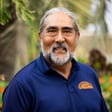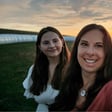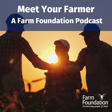
3. Farm Foundation's Meet Your Farmer Podcast with Steve Kaufman
Farm Foundation’s Meet Your Farmer podcast featured Steve Kaufman in season 1, episode 3.
Steve Kaufman is a fifth-generation farmer. He returned to his family's Idaho farm full time in 2014 when his uncles and father were ready to retire. He and his two brothers farm 14,000 dryland crop acres, growing primarily winter wheat, spring wheat, peas, garbanzo beans, and canola. Prior to that, he worked at Northwest Farm Credit Services while also farming part time. Steve is an alum of Farm Foundation's Young Farmer Accelerator Program.
In this episode, Steve talks about how gratifying it is to produce enough grain for 30 million loaves of bread on his farm, the hard work of trying to balance life with young kids and farm life, and what the process was like to switch over to no-till.
Music: "Country Roads" by Sergii Pavkin from Pixabay
Reach us at communication@farmfoundation.org.




